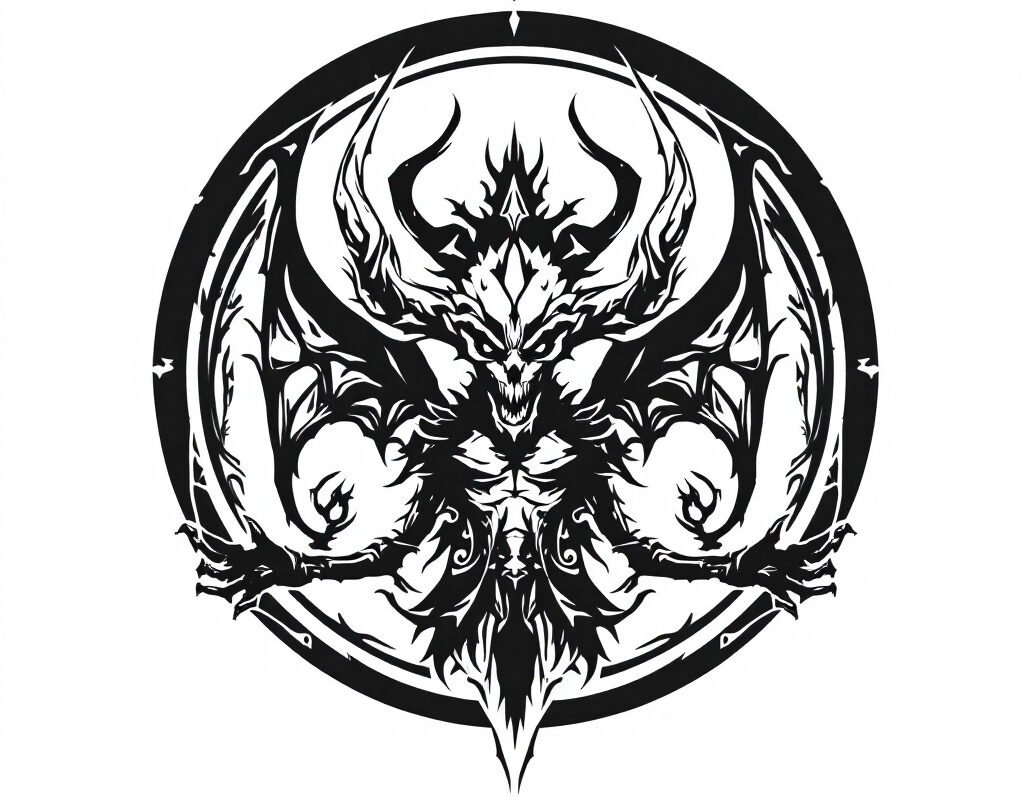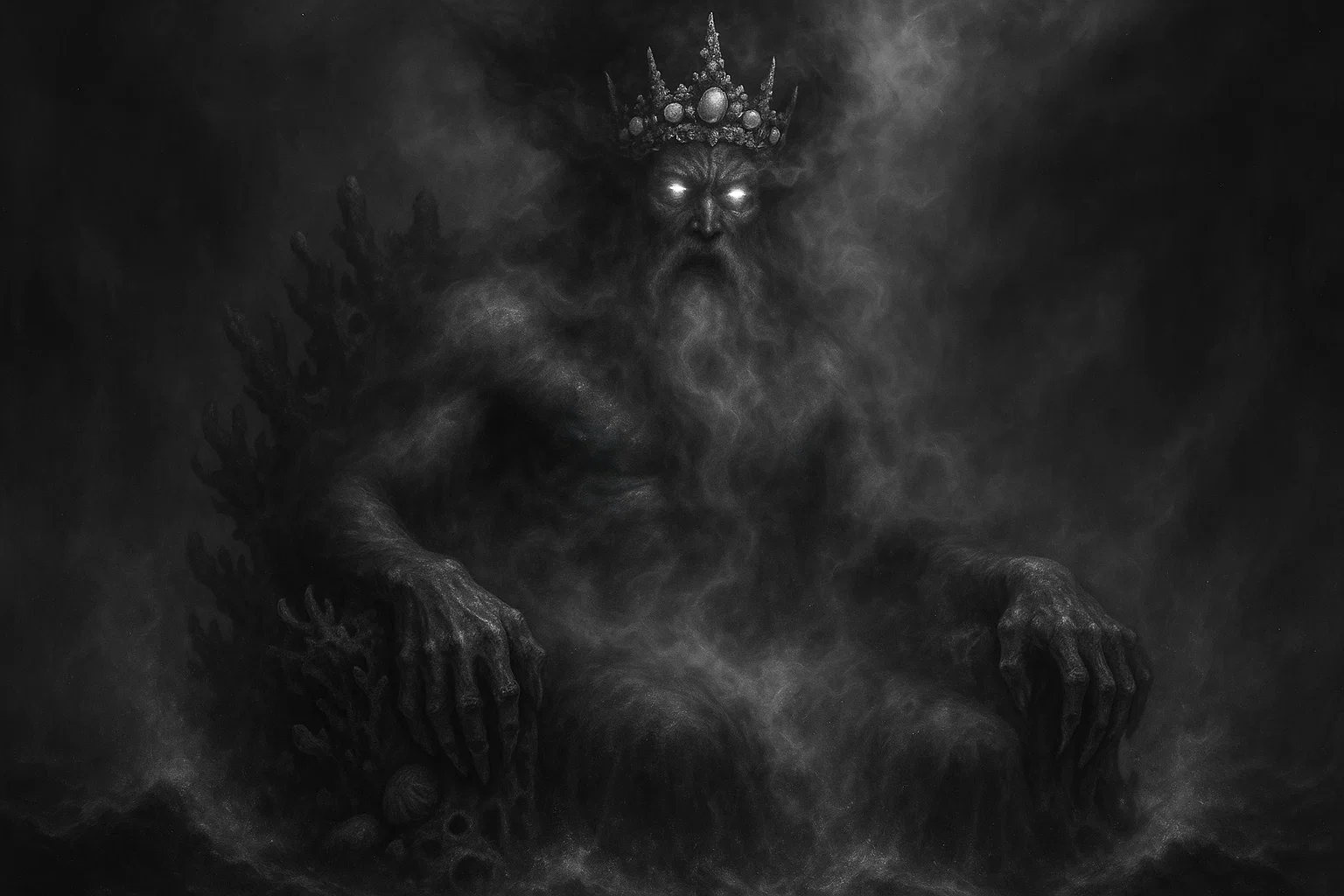Marid is one of the most formidable types of jinn in Islamic lore. He is renowned for his immense strength and unwavering defiance. This supernatural being—part of the broader class of jinn created from smokeless fire—lives in hidden realms parallel to our own.
Unlike weaker jinn, Marid commands respect through his raw power, often tied to the churning depths of oceans and vast skies. He appears in ancient texts as a rebel who challenges authority (whether divine or human), making him a symbol of untamed force.
Summary
Key Takeaways
| Attribute | Details |
|---|---|
| Names | Marid, Mārid, Blue Jinn; variations include rebellious giant or water devil in folklore. |
| Type | Powerful sea-dwellers, classified as chthonic demons among jinn, stronger than most but akin to ʿifrīt in might. |
| Title | Rebellious One, Giant of the Depths; sometimes called King of Water Spirits in tales. |
| Gender | Typically male, though folklore shows ambiguous or female forms in shape-shifting. |
| Servitors | Lesser water jinn or bound ʿifrīt; commands schools of weaker sea entities in legends. |
| Superior Jinn | Iblis (as overlord of rebellious shayṭān); some texts place them under no direct lord due to defiance. |
| Powers | Stirs storms and floods to drown foes; eavesdrops on angels for forbidden knowledge; twists wishes to curse granters; moves massive objects like ships or thrones. |
| Appearance | Towering figures with ocean-blue skin, eyes like storm lightning, and forms shifting from misty vapors to raging waves or humanoid giants. |
| Etymology | From Arabic root m-r-d, meaning “rebellious” or “recalcitrant”; echoes Hebrew terms for rebel, tied to defiance against order. |
| Associated Figures | King Solomon (who bound them); Iblis (their tempter); prophets like Ali in narrations of confinement. |
| Weaknesses | Bound by seals like Sulayman’s ring; repelled by Ayat al-Kursi or iron tools; outwitted by reverse commands due to literal pride. |
| Opposing Holy Figure | Archangel Jibril (guardian against eavesdroppers); Prophet Muhammad (who subdued ifrits); King Solomon via divine ring. |
| Social Structure or Tribe | Leaders of water tribes, ruling hidden ocean clans with strict hierarchies of lesser jinn. |
| Followers/Tribe Size | Commands vast tribes of sea jinn, numbering in legions as per folklore epics like Sirat Sayf. |
| Element | Water (primary); ties to air through storm-summoning. |
| Planet/Zodiac | Neptune (for oceanic depths); Pisces (water sign of illusion and rebellion). |
| Color(s) | Deep blue (storm seas); black (abyssal voids). |
| Number(s) | 7 (tides and waves in rituals). |
| Crystal(s)/Mineral(s) | Aquamarine (sea control); obsidian (binding rebellious forces). |
| Primary Sources | Quran (Surah As-Saffat 37:1); Hadith narrations by Ali ibn Ibrahim al-Qummi; One Thousand and One Nights (Fisherman tale); Shams al-Ma’arif (binding rituals); Sirat Sayf ibn Dhi-Yazan (pre-Islamic epic). |
“Marid” Meaning
The meaning of the name “Marid” centers on a deep sense of defiance found in old Arabic words. The name likely originates from the Semitic root “m-r-d,” meaning rebellion or stubborn resistance. It paints an image of a force that fights against rules, like a strong current pulling against the shore.
This characterization fits well with how this jinn is portrayed in old tales: he ignores commands, breaks agreements, and battles chains with fierce drive. Ibn Manzur, in his book Lisan al-Arab, points out this as a mark of the wild, linking it to huge spirits that defy the heavens.
However, over time, Marid’s definition expanded to encompass more than just any singular fighter jinn—it became a label for some of the strongest kinds of evil jinn. A class of malevolent jinn, if you like. Hans Wehr’s word list refers to them as “demons” or “giants,” illustrating the shift from a broad term for the defiant to a distinct group of unseen powers.
The entire meaning of the word “Marid” also changed across lands. For instance, before Islam, Arabs viewed them as spirits of the rough seas, free and fierce. With Islam’s rise, it fit into jinn groups, the Quran naming them “shayṭān mārid” (rebels). These changes show us something important: in North Africa, Marid were more like sea rulers; in Persia, they were closer to powerful enemies.
How to Pronounce the Jinn’s Name in English
Say Marid as “MAH-reed.” The first syllable rhymes with “car,” stressed hard, and the second like “reed” in a plant. Roll the “r” lightly, if possible, like in Spanish, to match the Arabic flow. Avoid “muh-RID”—keep it smooth, two beats.
What Does Marid Look Like?
Depictions of the Marid draw from old sources, portraying him as an awe-inspiring force of nature rather than a fixed shape.
In One Thousand and One Nights, he rises from a jar as a swirling mist of blue vapor, coiling like sea fog before snapping into a giant form. His body gleams with wet scales or deep azure skin, eyes flashing like lightning over waves. Arms stretch long to grasp ships, and his voice booms like thunder, shaking the air.
During summons, Marid often manifests in stages: first, a chill wind off the water, then ripples in the air that turn solid. According to Sirat Sayf ibn Dhi-Yazan, the Marid is a tall man with storm clouds for hair, feet rooted in foam. He can shift easily—into a large whale to drag sailors down or eagles to scout from heights. Invisible most of the time, he can strike when seen: a hand from the mist yanking victims to depths.
You may also enjoy:
Who Is Ahriman, and Why Is He Pure Evil Incarnate?
January 8, 2026
Edimmu: The Mesopotamian Wind Demon That Steals Life
November 6, 2025
Pazuzu: The Demon Who Fought Evil with Evil
November 4, 2025
Iblis, the Jinn King of Darkness and Deception
September 29, 2025
Ifrit: Demon of Fire Who Serves Iblis in Islamic Tradition
September 30, 2025
Who Is Arioch, the Demon of War and Vengeance?
January 21, 2026
Origins
The Marid is an ancient jinn. Early nomads spoke of the terrifying “māridah” born from fire but tied to the fury of the waves. Stories of wise yet fierce giants—like the Mesopotamian apkallu—slipped in through caravans and quickly spread in the nearby lands.
Before written words fixed them, oral tales painted Marid as an ocean lord, guarding hidden pearls or drowning the bold. Tribal songs from Jahiliyyah times warned of his pride, how he twisted oaths, and sank boats for fun.
In Yemen’s coasts, he ruled dives; in Hijaz hills, he haunted wells. These beliefs grew from nature’s might—floods as wrath, calm seas as rare grace.
As Islam dawned in the 7th century, this demonic spirit found new frames. The Quran “bound” the jinn, calling him a fire-born peer to man, answerable to God.
By the Abbasid era, Marid had become a prominent figure in books and courts. The famous Solomon’s ring was said to have chained the jinn for temple building, mixing Jewish tales with Arab style. In Persia, Marid fought heroes like divs; in India, he mixed with local ghosts.
Was Marid Ever Mentioned in the Quran or Hadith?
Marid appears in the Quran as a marker of rebellion, tied to evil spirits barred from heaven:
| Source | Quote |
|---|---|
| Quran 37:7 | And indeed, We have put constellations in the heaven and made [therein] beautiful ornament and protection against every rebellious devil. |
| Quran 37:6-10 | We have indeed decked the lowest heaven with lamps, and have made such (lamps) (as) missiles to drive away the evil ones (shayatin marada), and have prepared for them the penalty of the blazing fire. |
| Quran 4:117 | They invoke not besides Him but female [deities], and they [in fact] invoke not except Satan, the rebel. |
| Quran 37:7-8 | We have adorned the lower heaven with the adornment of the stars and to preserve against every rebel satan (Shaytan marid); they listen not to the High Council for they are pelted from every side. |
| Hadith (Ali ibn Ibrahim al-Qummi) | When God resolved to create Adam, He punished the predecessors of mankind by obliterating the nasnas, erecting a veil between jinn and humans, and confined the rebellious giants (māridah) to the atmosphere. |
| Hadith (Ramadan narration) | When the first night of Ramadan comes the devils and the rebellious jinn [marid] are chained, the gates of hell are locked, and not one of them is opened; the gates of paradise are opened and not one of them is locked, and a crier calls, ‘You who desire what is good, come forward, and you who desire evil refrain.’ Some are freed from hell by God, and that happens every night. |
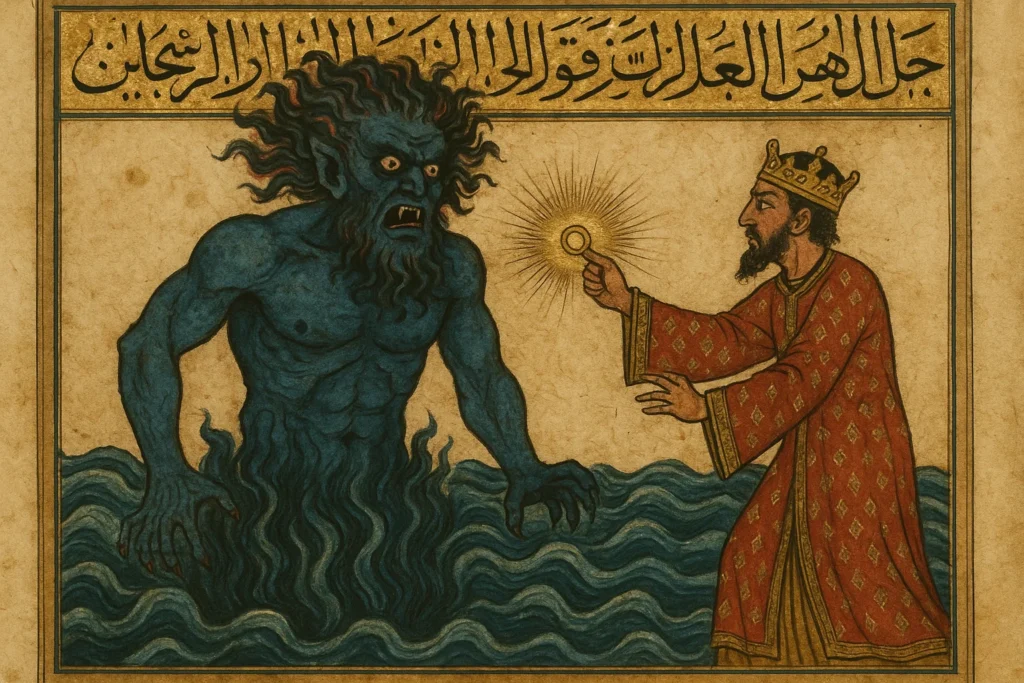
Marid in Grimoires and Other Texts
Beyond core Islamic texts, Marid appears in several other occult works and folklore, often as a bindable power or epic foe:
| Source | Quote |
|---|---|
| One Thousand and One Nights (Fisherman and the Jinni) | Thereupon the Jinni shook and became a column of smoke, which grew skyward till it issued from the jar’s mouth and then became a fume that took the semblance of a man huge of stature… “I am the Jinni of the jar… and I will kill you.” |
| Sirat Sayf ibn Dhi-Yazan | The Marid said, “O King, I will not obey thee in this,” for its rebellious nature forbade it, but Sayf commanded the opposite, and thus it led him true. |
| Shams al-Ma’arif (binding rite) | By the seal of the rebellious one, the Marid of the deeps shall rise and serve, bound in azure chains against the tide. |
| Shams al-Ma’arif (jinn summoning) | The mysteries of the letters and the names of God shall compel the jinn, including the powerful Marid, to appear and fulfill the command. |
| Kitab al-Ajnas (wish rite) | Call upon the Marid with flattery and bind with the ring; they grant desires but twist the unwary. |
Powers and Abilities
Marid wield forces that dwarf lesser jinn. His powers typically invoke the chaos and the forces of nature:
- Storm Summoning: Calls gales and floods to swallow fleets.
- Master Spy: He can climb to the heavens to spy on angels, stealing prophecies.
- Wish Twisting: Grants boons from jars but warps them—riches turn to lead, love to obsession.
- Shape-Shifter: Morphs to beasts or waves for ambushes.
- Superhuman Strength: Lifts thrones or boulders like foam.
- Master of Illusions: Crafts false seas or drowned kin to lure prey.
- Floods: Drowns minds in greed or rage visions.
Influence on Humans and Possession
According to the Islamic tradition, Marid latch onto humans through gaps in faith or moments of weakness, wielding a tidal force unmatched by lesser jinn. His malevolent influence, known as sihr (sorcery), twists thoughts toward dark desires, planting sudden urges to curse enemies, hoard forbidden knowledge, or seek power through hidden means.
Unlike common jinn, Marid overwhelm with a flood-like grip, drowning resolve in waves of obsession.
Signs of his touch include victims feeling cold shivers as if plunged into icy seas, dreaming of endless black waters, or suffering fits of rage that surge like storms.
The qarin, a personal jinn shadow tied to each human from birth, becomes a dangerous tool for Marid. When a Marid binds to a qarin, it amplifies personal flaws—envy turns to paranoia, making friends seem foes; pride swells into reckless gambles.
Protection and Exorcism Methods
Sahih Muslim recommends placing salt circles around homes, mimicking natural sea barriers to ward off the advance of this evil jinn. Iron nails in doorframes can allegedly pin the jinn’s fluid form (a practice tied to Bedouin wards against storm spirits). Reciting Ayat al-Kursi three times at twilight weaves a divine veil, shielding against rebellious jinn who roam at night.
For active hauntings, burning rue over hot coals releases smoke that chokes the jinn. Furthermore, black threads dyed in squid ink, tied at wrists, are said to knot their influence.
Some texts (like Shams al-Ma’arif) suggest sprinkling seawater mixed with saffron at thresholds. Its golden color resemble divine light and can repel demonic entities. Hadith also mentions blowing breath over water after reciting Surah Al-Ikhlas, then sprinkling it on the afflicted to cool Marid’s fiery roots.
You may also enjoy:
Who Was Ravana in Hindu Mythology and Why Was He Feared?
October 3, 2025
Bali: The Benevolent Asura King of Hindu Mythology
October 10, 2025
Arati: The Beautiful Demon of Aversion in Buddhist Mythology
October 15, 2025
Nasnas: The Monstrous Demon Hybrid That Haunted Pre-Human Earth
November 12, 2025
Who Were the Hinn, the First Spirits of Creation?
November 12, 2025
Who Is Shiva, the Destroyer and the Lord of the Universe?
November 12, 2025
Marid Myths, Legends, and Stories
The Fisherman and the Vengeful Marid
In days of old, a simple fisher cast his net into the rolling waves four times daily, hauling just enough to keep his family from want. One clear morning, a great pull strained his line; not schools of silver fish, but a heavy brass vessel, capped with lead marked in forgotten signs.
Drawn by wonder, he broke the seal. Thick smoke poured out, climbing to touch the clouds, then fell back as a vast form—hide like dark tides, stare sharp as reef edges, bulk taller than date trees.
“I stand as the Marid of the abysses,” it growled. “Locked away long ago by Solomon’s heirs for felling a lord who loosed me. In thanks, I pledged to end my freer. You snapped the tie—now face doom!”
The fisher dropped to his knees, pulse racing. “Mighty one, hold back! I set you loose; allow a gift first—share your account true, as rulers learn before rulings.”
Vanity rose in the Marid; it cherished its own words. “Listen close: I held sway over swells beneath lights, sinking armadas for play. A wizard snared me in this pot amid gale chants, swearing my duty. I toiled bitterly, raising towers from bubbles, till fury surged. I crushed his keep, swamped his rooms—yet he shut me firm, damning my title. Eras spun; waters climbed and dropped. Now unbound, my vow calls for your close.”
The man dipped his head wise. “Grand account, but consider: if I shut you again, would my line not free you once more? Better show your strength—send me secure, and let ages judge the rash.”
To mock the lock, the jinn shrank to the size of a bird and rested on his arm. “Seek three favors, speck, but curse if they offend.”
The fisher asked plain gifts: fresh years for his boys, webs full of catch, calm in his dwell. Each given straight, for the ego hid the plain snares from the colossus.
The Marid couldn’t twist the fisherman’s words. No loopholes. No way to turn wishes into nightmares. He was defeated.
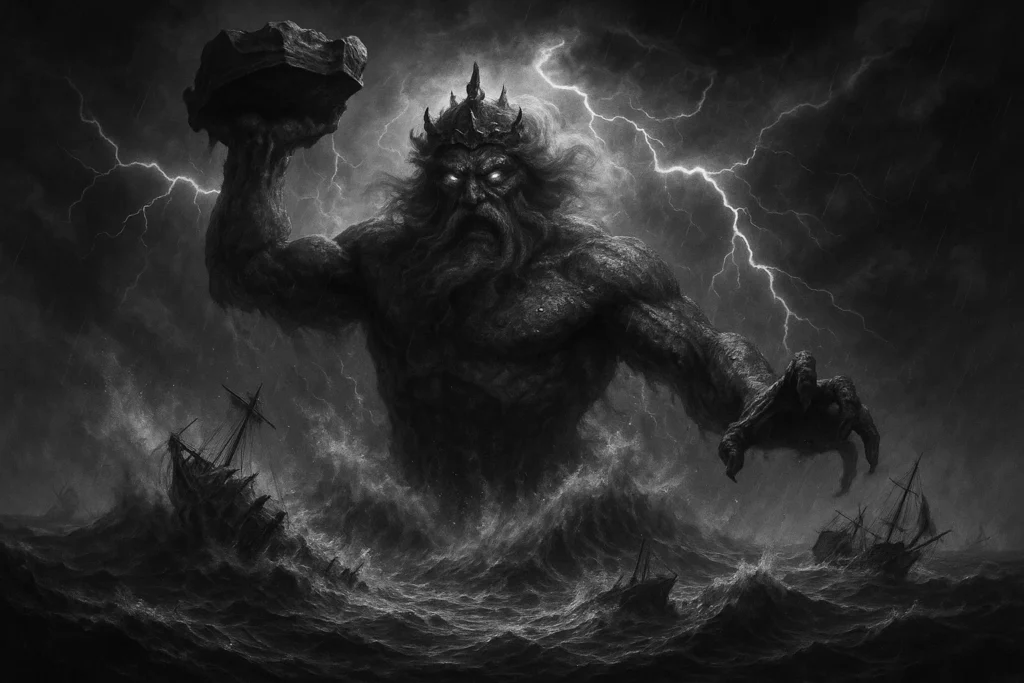
The Trickery in Sayf’s Quest
In a distant past, Prince Sayf, the son of Dhi Yazan, yearned for honor after rivals had usurped his rightful throne. Prophetic seers informed him of the ancient treasure of Solomon, a wealth that could help his reclamation of the kingdom. They also guided him to secret caves where Sayf found a sage who advised him: “Summon a Marid, but refrain from directly talking to him, for his perception distorts the truth akin to the way seaweed shifts in water.”
At midnight, Sayf drew rings in the sand and invoked rituals from ancient texts. The winds howled, and salt stung his eyes. A colossal figure then emerged, formidable as a cliff, possessing arms resembling gnarled roots and exhaling clouds of starlight. “Mortal, what compels you to disrupt my slumber?” the Marid growled, with waves accumulating at its feet.
“O great sovereign of the tides, guide me to Solomon’s wealth,” Sayf confidently proclaimed, maintaining his composure. The Marid responded with a chuckle, mist dispersing from its form. “Fool! I heed no one—yet your words amuse me. I shall guide you, albeit with the intent to mock your deceptions.”
They navigated through the mist, with the giant parting hills as though they were crashing waves. Paths twisted, and illusions disintegrated—pools formed only to vanish into voids.
Upon reaching the entrance to the treasure, concealed behind jewels and intricate markings, the Marid swept aside the stone barricades. “This hoard scorns kings; seize it, and you shall vanquish your adversaries.” Sayf took hold of the radiant treasure, dazzling in its brilliance. Yet, while admiring the wealth, the colossal being stated, “Now, you must render a fee—your life in exchange for my service.” Sayf raised a sealing band, reminiscent of Solomon. “With this, you have contributed—now descend into obscurity, bound in servitude.”
Fury surged within the Marid, which expanded into a tempest, but the band radiated light, ensnaring its form. It fell, lamenting and cursing into the winds.
Sayf reclaimed his sovereignty; however, storms besieged his reign, serving as a reminder that deception can ensnare even the strong.
Marid vs Other Jinn
| Jinn Name | Associated Traits/Influence | Rank/Origin | Key Traits/Powers |
|---|---|---|---|
| Ifrit | Vengeance and destruction; incites fiery wrath in hearts. | Underworld king; Quran (Surah An-Naml). | Commands flames to burn foes; shape-shifts to beasts; hard to bind without holy fire. |
| Ghul | Grave-haunting gluttony; lures wanderers to devour flesh. | Desert scavenger; Hadith warnings. | Mimics lost kin to trap prey; regenerates from wounds; tied to night sands. |
| Qareen | Personal temptation; whispers sins tailored to one’s flaws. | Birth companion; Islamic theology. | Knows all secrets from cradle; sows doubt invisibly; convertible by faith. |
| Shaitan | Broad evil seduction; leads tribes to polytheism. | Devil’s aides; Quran multiple verses. | Casts illusions of gain; multiplies whispers; chained in holy months. |
| Hinn | Animalistic cunning; preys on the weak like packs. | Primitive predecessor; folklore sightings. | Appears as dogs for hunts; weak alone but swarms; tied to wild howls. |
| Nasnas | Monstrous half-form terror; offspring of forbidden unions. | Hybrid curse; Arabian tales. | Hops on one leg to strike; drains strength on touch; born of shiqq sins. |
| Jann | Desert mirage mischief; hides oases from the lost. | Ancestral shifters; pre-Islamic lore. | Forms whirlwinds to mislead; reveals water for pacts; open to human aid. |
| Shiqq | Split deformity horror; breeds abominations in shadows. | Lower half-beast; Hadith fragments. | Crawls as torso fiend; mates to spawn nasnas; weak light scatters it. |
| Si’lat | Shape-shift seduction; mimics beloveds for betrayal. | Master impersonator; Persian-Arab blends. | Copies voices perfectly; drains life in embraces; dawn reveals true slime. |
| Palis | Vampiric thirst; licks feet in sleep for blood drain. | Desert foot-fiend; Somali-Arab myths. | Low wit, outsmarted by soles crossed; leaves husks; tied to barren nights. |
| Sila | Night shade allure; haunts lovers with false passions. | Ghul kin shifter; medieval grimoires. | Blends beauty and bat-form; induces lust fevers; repelled by pure salt. |
| Tawaghit | Tyrant possession; claims idols for false worship. | Statue demons; occult warnings. | Infests carvings to speak lies; crumbles under faith strikes; hoard cursed gold. |
| Ghilan | Grave whisperer; stirs unrest in burial grounds. | Night shade haunter; folklore graves. | Changes to dust swirls; echoes regrets to madden; full moon swells power. |
| Zuzula | Underworld chaos; winged claws rend the bold. | Horned clan fiends; horror yarns. | Flies in packs to tear; brews underworld fogs; iron horns as weapons. |
Position Among Jinn
In jinn hierarchies, Marid holds court as an elite rebel, outranking most in brute force but clashing with overlords. According to al-Buni’s Shams al-Ma’arif, the Marid is above the Ifrit in water command, yet below Iblis’s shayṭān web.
As sea king, he leads clans in hidden grottos, numbers swelling to thousands per epic counts, drilling lesser jinn in tide wars.
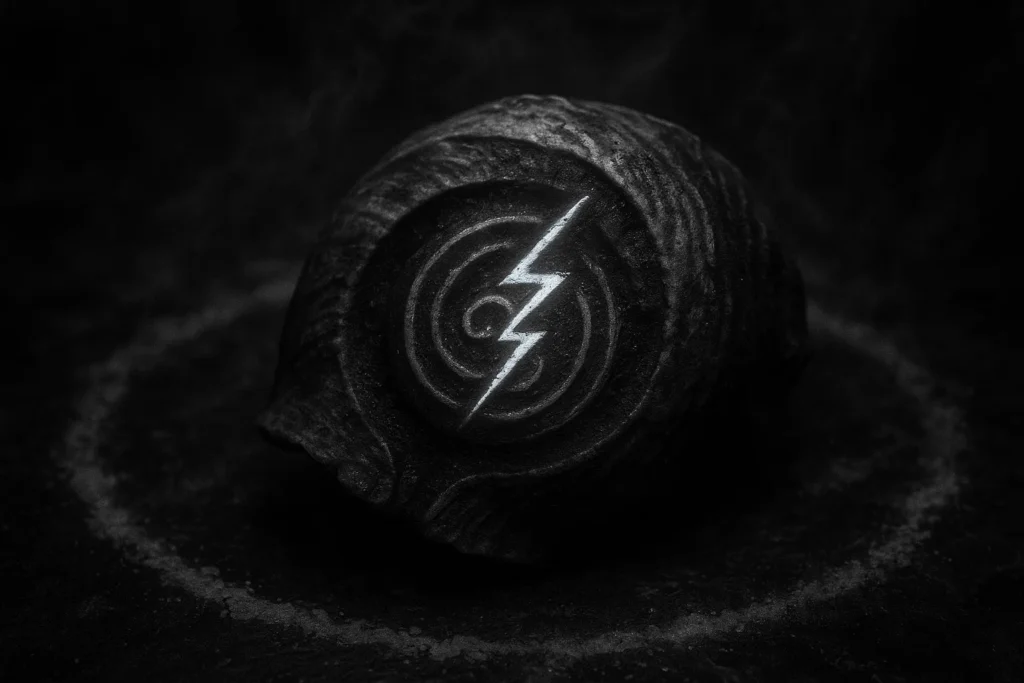
Associations
The Marid can be linked to cosmic forces that amplify his stormy spite, turning water from a life-giver to a grave-maker.
Zodiac and Astrological Links
Marid aligns tightly with Neptune, the planet of deep mysteries and deceptive currents, which fuels their ability to weave misty veils that cloud judgment. His power peaks under Pisces, the water sign of illusion and rebellion, where his fluid nature thrives—summoning at equinox tides, when stars align low.
Shams al-Ma’arif ties this jinn to lunar phases, with the full moon swelling his waves to drown prayers, while the new moon cloaks his whispers in shadow.
Elemental Associations
Water rules Marid’s essence, shaping his form as crashing waves or illusory pools that drag victims under. This tie allows the jinn to command seas, summon floods, and craft mists to trap their foes.
Air plays a secondary role, fueling the births of his storms and carrying their whispers across the skies.
West, where suns sink into seas, aligns with their gales, blending the weight of water with the speed of wind to blind and disorient.
Colors, Numbers, and Crystals
Deep blue evokes stormy seas and dark skies, used in rites to summon the jinn or stain auras with their chilling influence.
Black mirrors the abyssal void, hiding their true forms and marking their pull toward despair.
The number 7 binds to Marid, tied to sea cycles—seven waves in tales, seven seals in bindings, or seven tides in curses. It marks his ritual flaws, as pride often fails in this regard.
Crystals like aquamarine channel their tide control, used in talismans to bind or repel their flow, its blue gleam a mirror of their seas.
Other Correspondences
Metals like iron chain Marid’s might, used in nails or rings to pin their fluid forms, rooted in Bedouin wards. Brass holds their essence in jars, its sheen a trap for their pride, while lead seals their curses in urns, heavy as their grudges. Herbs tied to their chaos: nightshade brews fogs to blind, its poison mirroring their deceit; rue repels with sharp scent, burning their watery breath; mandrake calls them in dark rites, its roots echoing their deep ties.
Animals reflect their nature: whales for vast size, dragging ships to depths; serpents for sly shifts, coiling through waves; eagles for air ties, scouting from storm heights.
Marid’s Sigil and Symbols
Marid‘s sigil, detailed in grimoires like Shams al-Ma’arif, acts as a lock on their watery wrath, drawn in squid ink on shell or parchment. Its core is a wave crest—three tight loops spiraling from a center dot, crossed by a jagged bolt for the storm’s bite. Draw clockwise from the dot, looping thrice for tides, then slash down-left to ground the mark.
Talismans with this sigil, hung over beds or woven into nets, ward off floods; etched on brass jars, they seal freed giants tight.
You may also enjoy:
Vritra: The Dragon Who Swallowed the Sky in Hindu Mythology
October 7, 2025
Aeshma: The Zoroastrian Demon of Wrath and Fury
January 13, 2026
Abura-sumashi: The Potato-Headed Yōkai That Punishes Greed
October 23, 2025
Aim (Aym): The Great Duke of Hell in the Ars Goetia
November 11, 2025
Who Was Mahishasura, the Buffalo Demon Slain by Goddess Durga?
October 3, 2025
Who Is Shiva, the Destroyer and the Lord of the Universe?
November 12, 2025
